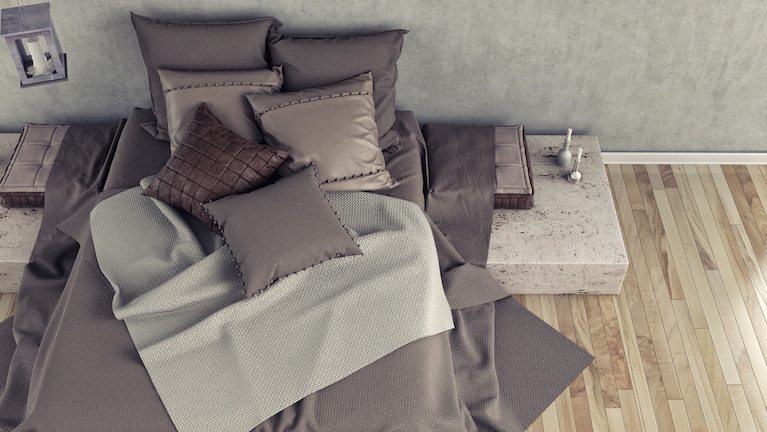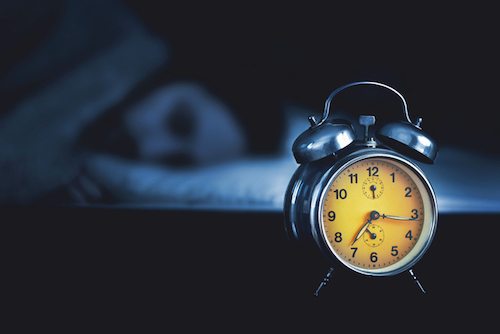It’s Day 14 in editor Anna Magee’s 21 days of sleep remedies blog ands is just realising the effect her cycle has on sleep patterns – scroll down to find out more.
From your choice of bedding to the way your alarm clock faces, there are several bedroom choices you’ve probably made out of sheer aesthetics or budget concerns that may be hindering you from doing that thing you’re supposed to do in your bedroom – well, other than that – which is sleep. That certainly was the case for me. I had some lovely silk bedding from lilysilk.com that I got for my birthday last year that looked gorgeous on the bed. Then, I fell in love with a bedspread from IKEA, so I bought that without really giving it a second thought. Now, just about every night I wake at 3am in a cold sweat (turns out my body doesn’t like silk and the bedspread was polyester), fretting about the next day’s work, overheated and generally uncomfortable, worrying about how I’m going to get back to sleep.
MORE: 13 natural sleep remedies proven by science
Why temperature matters
When I spoke to sleep expert James Wilson, aka The Sleep Geek, he explained that after light,
temperature has the greatest impact on our circadian rhythms (our sleep/wake cycles), and our bodies are very sensitive to it. ‘It only takes a change in core body temperature of 0.5 degrees Celsius for our bodies to start waking up’. I need real warmth to fall asleep so I use an electric blanket and the heat of my partner, to fall asleep. But then I wake up so warm!
When it comes to bedroom temperature we should be looking for somewhere between 16-20 degrees
On a physiological level, sleep is simple, explains James. ‘To produce melatonin [the sleep hormone] we need a drop in heart rate and a drop in core temperature. If both of these things happen then our body will produce melatonin most efficiently’. Having a bath or shower can trick our body as we get really warm then really cold quickly so it triggers the melatonin production. Doing it half an hour before bed gives the best effect. Other things that can impact on core temperature, he says, are eating a heavy meal too late in the day and exercising too late in the day. For both we should leave three hours before we go to bed.
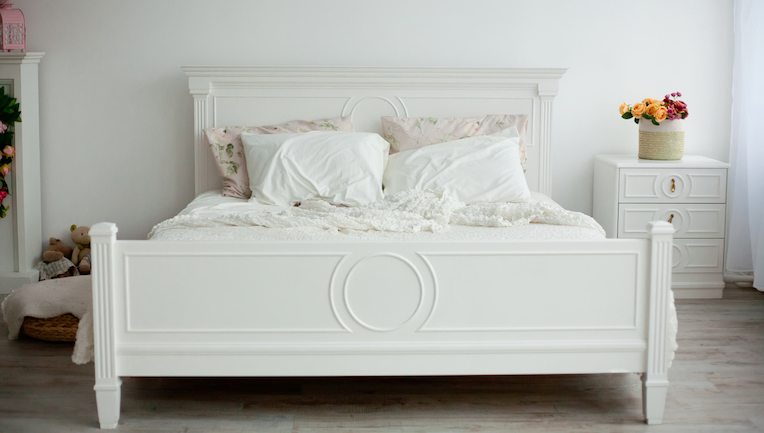
When it comes to bedroom temperature we should be looking for somewhere between 16-20 degrees Celsius, because it is thought that melatonin production is more efficient between 16-20 degrees. So, keeping our thermostat at 25 isn’t the panacea I thought it was, then. ‘It is preferable for the bedroom to be cooler than the rest of the house to encourage a drop in core temperature,’ says James.
‘At the moment the electric blanket mimics the effect of a bath, so your body gets warm and it sweats so you get a drop in core temperature which triggers melatonin production,’ explains James. However your body expects the core temperature to continue to drop then level out and if the blanket is keeping
the core temperature artificially high as you go through your sleep cycles during the night you are more likely to wake up.
Making over my sleep environment
Step One: lose the electric blanket
The most obvious solution would be to give up the electric blanket as it’s causing me to overheat, James explains. I’ll try it but a warm bed has become a cue for sleep for me that will be hard to break. Still, it’s called sleep rehab for a reason, so I’ll give it a go, replacing my electric blanket with nothing more than a cup of warm nighttime tea from Pukka Herbs.
Step Two: Sort out the duvet (and sleep naked)
‘When it comes to duvets tog rating is a measurement of heat retention’, says James. ‘If you have a synthetic or feather/down duvet they are designed to trap moisture in and it is this moisture heating up which makes your environment warm.’ Instead, he suggests materials such as Alpaca fleece. ‘Alpaca is my top choice’, says James, ‘but bamboo, wool or silk allow your body to breathe so the moisture
disappears. This will make you less likely to be hot’.
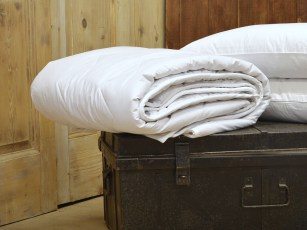
For my test I’ll be using the alpaca duvet and two pillows from Penrose Products. Penrose are endorsed by the Vegetarian Society so I know no cut alpacas were harmed in their production, plus they’re a small family company, the kind I love to support.
‘The alpacas we make our duvets from come from Peru and live in environments that shift from +40 degrees in the day to -30 degrees at night,’ says Paul Whittey, of Penrose. ‘They are the most carbon neutral of animals with ten Alpacas to one cow in terms of carbon footprint.’
The best way to sleep in the bedding is without clothes on,
Alpaca fibre is a hair that works in a similar way as the hair on our heads by drawing moisture (wicking) to the ends of the follicle and then evaporating into the atmosphere, Paul Explains. ‘Unlike wool that is of various layers and coated in lanolin to protect from the rain’.

The best way to sleep in the bedding is without clothes on, suggests Paul. ‘ Okaaayyyyy. If you prefer to wear bed clothes then please avoid a synthetic material as this will reduce the impact of the bedding. We sleep all year around under ours with the windows open with only the one weight of duvet, unlike wool where you would need several different weights.’
An organic alpaca wool duvet costs £175 from penroseprodicts.com
Step Three: …and the bedding
‘Bamboo bedding is better than cotton or synthetics as it is more breathable and adds to the impact of the duvet,’ says James. I source a bamboo bedding set from allbamboo.com as recommended by James. The feeling of the bedding is just divine; like a cross between fine cotton with a hint of the slip of silk and the first night I sleep in it – last night – I feel like I am sleeping in an expensive hotel. I highly recommend these sheets just for their feel alone (oh and I slept all the way through last night – but it was. a Saturday and when it’s not a work night, I tend to have no problems sleeping). The picture below is from the allbamboo website and gives an idea of just how gorgeous the bamboo bedding looks.

Right, so why bamboo? According to All Bamboo, it’s all about the material’s ability to wick moisture away from the body.

The absorption, wicking and ventilation properties of bamboo are superior to that of cotton, All Bamboo claim, making it the perfect choice for those who overheat at night. Bamboo viscose is extremely breathable – more so than cotton, hemp or many oil-based synthetic products and its structure and absorption properties aid coolness in the summer and warmth in the winter. Bamboo fabric is also hypoallergenic, meaning it has a decreased tendency to cause an allergic response, making it perfect for those who suffer from sensitive skin or eczema.
A bamboo double bed set costs £76 at allbamboo.com
Step Four: Wake up to natural light
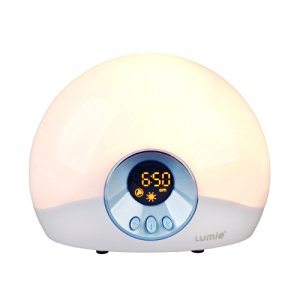
We’ll see how it goes. I have put my old tried and true clock on standby, just in case.
Step Five: Turn your clock away
Checking the time in the middle of the night can be disruptive as it can often lead you to work out how many hours you’ve slept so far and how much sleep you have left before your alarm goes off. Then you start overthinking about tomorrow – it’s a vicious cycle.
It’s this kind of brain activity that could lead to you to lying awake for ages. This turns on your sympathetic nervous system (the part that deals with problem solving and focus) instead of your parasympathetic nervous system (the one you need on when you’re sleeping as it promotes rest).
This week I’ll be listening to the countless experts that have suggested this to me and turning my alarm clock to face the other way, trying not to be tempted to check it if I wake up, instead just lying there feeling cosy, in the hope that I’ll fall back to sleep. Apparently, the key is not worrying about the sleep you’re losing. So here goes.
Watch this space throughout this week to see how my new sleep makeover performs. Other measures I am taking include:
- Magnesium therapy every night – find out why here
2. Waking up and going to sleep at the same time every night – this has been a real challenge for me as I sleep in like a sleeping machine every weekend. I’m trying this (waking up every day at 5.30 and going to sleep every night at 10.30pm) for the next fortnight and reporting back.
Day 10 – About the bedding…
Having turned my bedroom into a sleep haven, sleeping on bamboo sheets with my alpaca duvet I have still been waking up at around 4-4.45am each morning but no nowhere near as hot and bothered as usual. The feeling of sleeping on bamboo sheets is utterly delicious. My silk sheets are a bit slippery in comparison and my cotton ones, well, they’re too coarse (yes I have read the Princess and the Pea, okay, but insomniacs will get this). There is something special about getting into a bed that feels like being in a luxe hotel room that makes not sleeping enough so much more bearable.
So, I can report that the temperature issue is improving since I changed the bedding to the more breathable, choices as recommended to me by sleep expert James Wilson. The alpaca pillows and duvets and the bamboo sheets, he said, are most effective for heat regulation and moisture wicking. Having slept in them now for three nights, I can attest that I am no longer waking up in a cold sweat like I was under my previous polyester duvet (sorry IKEA). Big wins for alpaca and bamboo.

An organic alpaca wool duvet costs £175 from penroseproducts.com and a bamboo double bed set costs £76 at allbamboo.com
But, my wakefulness issues remain. I have to be honest and admit I haven’t been taking James’ advice to go to sleep and wake up at the same time every night. I can’t do it even though I know I have to to get this sleep thing sorted. I’ve been hitting the town, as much as a 47 year old woman can hit the town, that is (it mostly means going out for tame dinners rather than clubbing). Getting in after midnight means my 5am starts have given way to 7ams so I could claw back some slumber.
I haven’t been doing my magnesium therapy as a result, any pre-bed relaxation or taking the daily walk that always helps has also gone out the window and my sleep is suffering. It’s made me realise how many variables impact the secret life of our nocturnal selves. Now I wonder if my lifestyle means consistently good sleep will never really be my thing and I can only really hope for the off good night’s sleep at a time (read below to see why this isn’t necessarily a bad thing).
Now, note to self: get back on the sleep therapy train. This week I promise to jump into the things I know work for my sleep:
- A walk during the day
- Magnesium therapy pre-bed
- Relaxing before bed
Meanwhile, there is some good news. It isn’t abnormal for someone to wake up at four in the morning, asserts James Wilson. ‘This is when our body is at its coolest, it is often when our bladders want to empty and psychologically we worry that we only have a few hours until our proper wake up time and begin to worry.
‘As someone who has had insomnia this was and sometimes still is my issue,’ says Wilson. ‘What I do is if I haven’t got back to sleep I get up and try and use the sleep deprivation to get better quality sleep the
next night and I try not to worry about it!’
I couldn’t get my light alarm clock to work so it’s back to the instruction manual we go
I’m going to try not worrying too much about being under slept and setting my alarm for my usual 5am again, rain or shine or nights out and get up anyway and see what happens.
Meanwhile, the wake up alarm light from Lumie. I hate writing negative reviews but I couldn’t get this to work to wake me up with anything other than a very loud alarm. The wake up light bit of it doesn’t want to play so it’s back to the instruction manual we go…More tomorrow.
Day 13 – The effect of your cycle on your sleep
Where you are in your cycle definitely changes your sleep. I know because I always sleep so much just before my period and then go to crazy-insomniac town during it. I asked my sleep guru James Wilson, aka The Sleep Geek what is going on.
‘Just before your period, levels of the hormone progesterone (which has a soporific impact on the body) increases so you feel more sleepy and should need a bit more sleep. In this time it would help if you can try and give yourself more sleep opportunity perhaps with more short naps,’ he suggests. Okay, so I can’t nap at Healthista Towers and this week I am finally getting my head around getting up and going to sleep at the same time every day (I have made a compromise with myself and made it 5.30am instead of 5am some days and 9am on weekends!)so I want to. I guess a walk hats suffice.
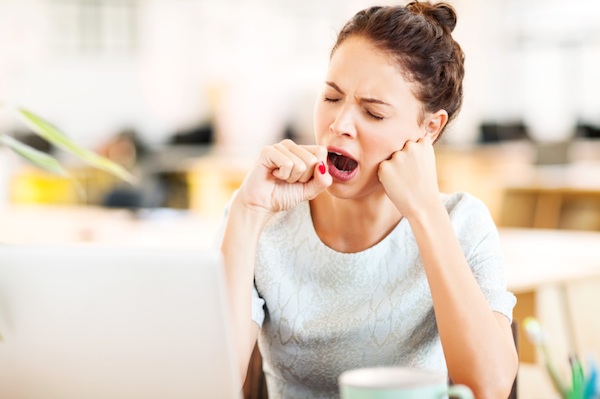
James continues: ‘During your period the levels of progesterone drop which has the opposite effect, you find it more difficult to sleep. At this time it is important to get that pre-sleep routine right, to ensure what you are eating and drinking during the day doesn’t have a negative impact on your sleep’.
during your period your core temperature goes up slightly
This is also the time I sweat buckets during the night. Why? ‘It’s important to have a cooler sleep environment as during your period your core temperature goes up slightly which can impact on the physiological process that creates melatonin, the sleep hormone and cause sweating. In addition to this the pain, nausea and stomach cramps caused by your period can impact on your sleep as well’.
The temperature issue? Resolved
I am so pleased to report the temperature issue has virtually resolved itself and this has been life-changing, thanks to my bedding makeover and the addition of an alpaca duvet from Penrose Products and bamboo sheets from All Bamboo. I’m sleeping with no sweats or temperature issues at all and now only wish I’d believed all the hype about the difference breathable bedding makes and made a change before now. I would recommend an alpaca duvet and pillows and bamboo sheeting to anyone who has issues with temperature and sleep.
I would recommend that combination of alpaca duvet and pillows and bamboo sheeting to anyone who has issues with temperature and sleep.
I should admit I received my duvet and sheets for free for promotional purposes but they have made such a difference to my life I will be purchasing more bamboo sheets and another duvet for the spare room. The duvet also allows you to sleep naked under it which is such a deliciously comforting, close feeling that even on nights when I am restless, and sleep little (like last night when the clocks went forward (I woke up thinking it was 4.55am when is was really 3.55am) I wake up a little happier about-facing after low-sleep day ahead.
Next week? Pills, potions, oils and sprays – does anything work?
MORE: Why magnesium is the key to better sleep – 21 days of sleep remedies – week 1
Like this article? Sign up to our newsletter to get more articles like this delivered straight to your inbox.



